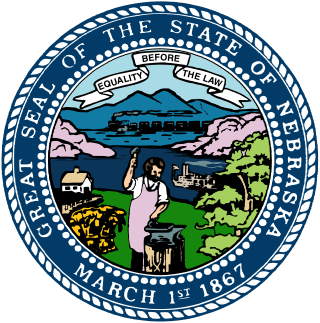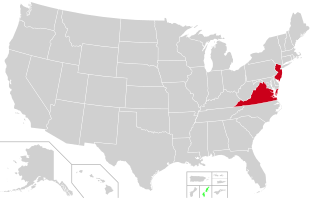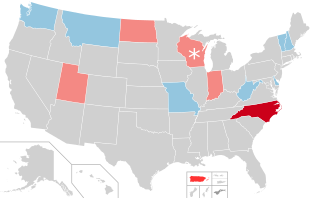
David Bennett Hill was an American politician from New York who was the 29th governor of New York from 1885 to 1891 and represented New York in the United States Senate from 1892 to 1897.

Kenneth Hood "Buddy" MacKay Jr. is an American politician and diplomat who served as the 42nd governor of Florida from December 12, 1998, to January 5, 1999, upon the death of Lawton Chiles. A member of the Democratic Party, he previously served as the 14th lieutenant governor of Florida from 1991 to 1998. During his career, he also served as a state legislator and as a United States representative and special envoy. Following the death of Bob Graham in 2024, MacKay is the only living former Democratic governor of Florida.

The 1978 United States Senate elections were held on November 7, in the middle of Democratic President Jimmy Carter's term. The 33 seats of Class 2 were contested in regular elections. Special elections were also held to fill vacancies.

The 2006 Nebraska gubernatorial election was held on November 7, 2006; the primary election was held on May 9, 2006. Republican incumbent Dave Heineman was elected to a full term, defeating Democrat David Hahn.

United States gubernatorial elections were held on November 4, 2008, in 11 states and two territories. Prior to the election, eight of the total seats were held by Democrats and five by Republicans. Two governors were prohibited by term limits from seeking re-election in 2008. The only governorship to change party was the open seat in Missouri, which was won by a Democrat after being previously held by a Republican.

United States gubernatorial elections were held on November 5, 2002, in 36 states and two territories. The Republicans won eight seats previously held by the Democrats, as well as the seat previously held by Minnesota governor Jesse Ventura, who was elected on the Reform Party ticket but had since renounced his party affiliation. The Democrats won 10 seats previously held by the Republicans, as well as the seat previously held by Maine governor Angus King, an independent. The elections were held concurrently with the other United States elections of 2002.

United States gubernatorial elections were held on November 2, 2010, in 37 states and two territories. These elections coincided with the elections for the United States Senate and the United States House of Representatives as well as other state and local elections. As in most midterm elections, the party controlling the White House lost ground. Democrats took five governorships from the Republicans, while Republicans took 12 governorships from the Democrats. An independent won one governorship previously held by a Republican, while a Republican won one governorship previously held by an independent. Republicans held a majority of governorships for the first time since before the 2006 elections. One state, Louisiana, had no election for governor, but it did feature a special election for lieutenant governor.
The Vermont Republican Party is the affiliate of the Republican Party in Vermont and has been active since its foundation in the 1860s. The party is the second largest in the state behind the Vermont Democratic Party, but ahead of the Vermont Progressive Party. The party historically dominated Vermont politics until the mid-20th century, but was replaced by the Vermont Democratic Party. The party currently has very weak federal electoral power in the state, controlling none of Vermont's federal elected offices. The only statewide office that the party currently controls is the governorship, held by Phil Scott.

United States gubernatorial elections were held on November 3, 2009, in the states of New Jersey and Virginia, as well as in the U.S. commonwealth of the Northern Mariana Islands on November 7, 2009. Both state governorships were previously held by Democrats elected in 2005, and both were won by Republicans in 2009; the local Covenant Party maintained control of the governorship of the Marianas. These elections formed part of the 2009 United States elections. As of 2024, this is the last election after which the Democratic party held a majority of governorships.

On November 8, 1994, gubernatorial elections were held in 36 states and two territories across the United States. Many seats held by Democratic governors switched to the Republicans during the time known as the Republican Revolution. Notably, this marked the first time since 1969 that Republicans secured the majority of governorships in an election cycle.

The 2008 United States elections were held on Tuesday, November 4, 2008, during the war on terror and the onset of the Great Recession. It was considered a Democratic wave election, with Democratic Senator Barack Obama of Illinois defeating Senator John McCain of Arizona by a wide margin, and the Democrats bolstering their majorities in both chambers of Congress, thereby marking the first time since 1992 in which the Democrats won Congress and the presidency in one election.

The 1966 South Carolina United States Senate special election was held on November 8, 1966 to select the U.S. Senator from the state of South Carolina. The election resulted from the death of Senator Olin D. Johnston in 1965. Then Governor Donald S. Russell entered in a prearranged agreement with Lieutenant Governor Robert Evander McNair in which Russell would resign his post so that he could be appointed Senator. However, former Governor Fritz Hollings won the Democratic primary election and went on to beat Republican state senator Marshall Parker in the general election to win his right to fill the remaining two years of the unexpired term.

United States gubernatorial elections were held in 12 states and two territories. Of the eight Democratic and four Republican seats contested, only that of North Carolina changed party hands, giving the Republicans a net gain of one governorship. These elections coincided with the presidential election on November 6, 2012. As of 2024, this marked the last time in which a Democrat won the governorship in Missouri and the last time in which a Republican won the governorship in North Carolina.

The 1996 United States elections were held on November 5 1996. Democratic President Bill Clinton won re-election, while the Republicans maintained their majorities in both houses of the United States Congress.

United States gubernatorial elections were held on November 4, 2014, in 36 states and three territories, concurrent with other elections during the 2014 United States elections.

The 1988 United States elections were held on November 8 and elected the president of the United States and members of the 101st United States Congress. Republican Vice President George H. W. Bush defeated Democratic Governor of Massachusetts Michael Dukakis. Despite Dukakis' defeat, the Democratic Party built on their majorities in Congress.

The 1978 Illinois gubernatorial election was held on Tuesday, November 7, 1978. Republican James R. Thompson easily won a second term in office, defeating Democratic nominee Michael Bakalis by nearly 600,000 votes.

United States gubernatorial elections were held on November 8, 2022, in 36 states and three territories. As most governors serve four-year terms, the last regular gubernatorial elections for all but two of the seats took place in the 2018 U.S. gubernatorial elections. The gubernatorial elections took place concurrently with several other federal, state, and local elections, as part of the 2022 midterm elections.




















